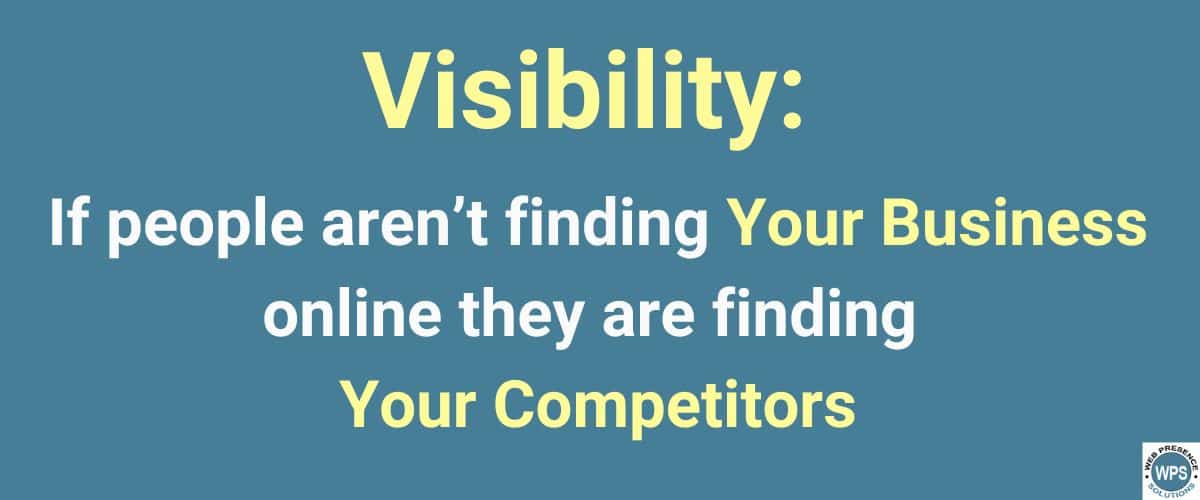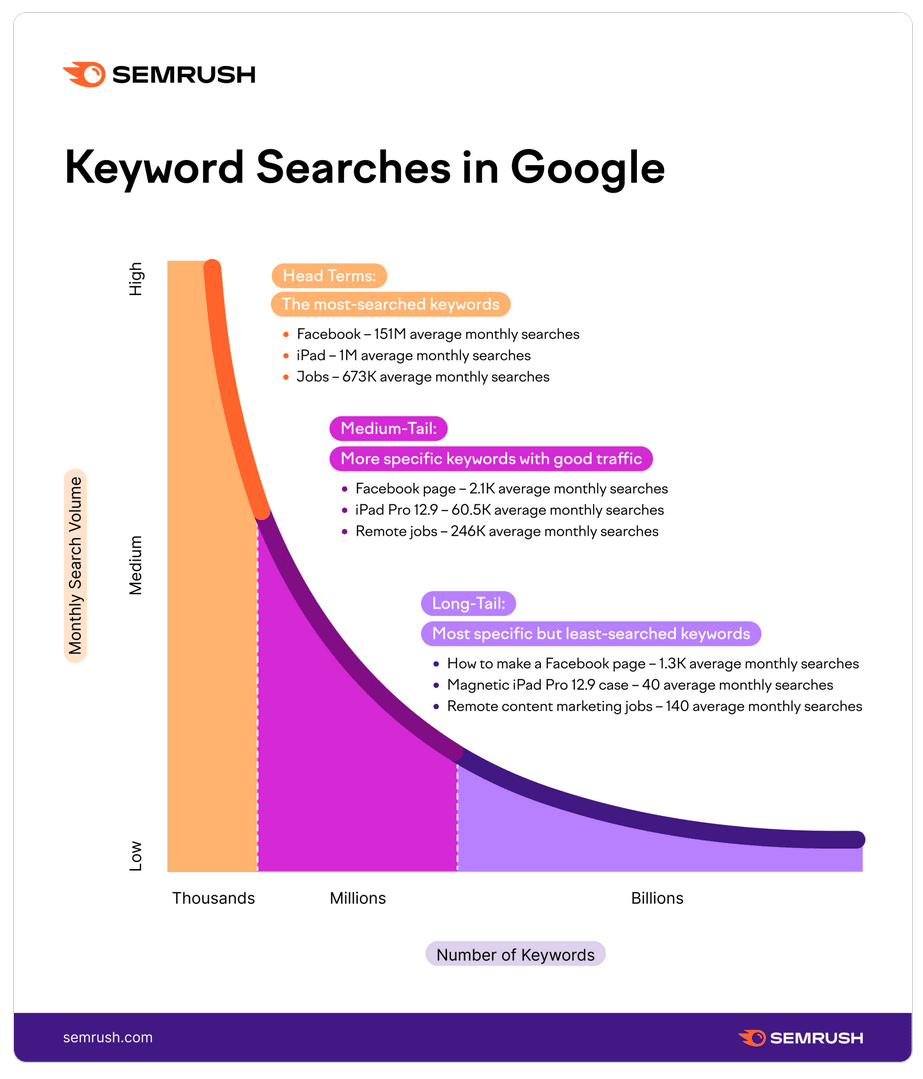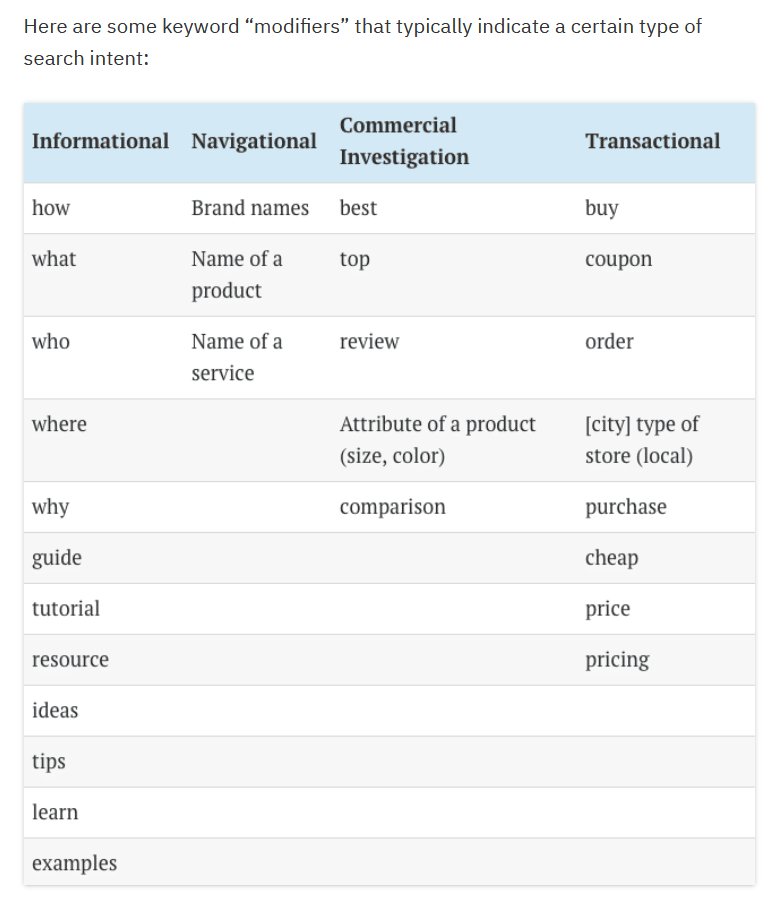SEO keywords are an essential part of a business marketing strategy.
From SEO, to pay-per-click ads, to social media and content marketing, keywords are a crucial element in success.
Keywords also play an pivotal role for a website to rank effectively in Google and other search engines.
However, ranking well in the Search Engine Results Pages (SERPs) for your targeted keywords is not a series of random events.
Achieving visibility for your business in the search engines and receiving the benefits of a growing amount of organic search traffic requires some work. This includes having a keyword strategy, an implementation plan, and an understanding of how SEO keywords can be used most effectively.
Section In This Post
1. Why Are SEO Keywords Important For Your Business
2. What Is Organic Search Traffic and Why Is It Important
3. What Is A Keyword and What Are SEO Keywords
4. What Are Long Tail Keywords and Short Tail Keywords
5. Getting Started with Keyword Research
**Use the links above to jump to a section of this post.
1. Why Are SEO Keywords Important For Your Business
Ranking on the first page of Google for a specific keyword is an important factor in driving targeted organic search traffic to your website.
The more relevant keywords that you rank highly for means that more searchers and more potential customers will find your products and services..
Improving your rankings in the search engines grows the number of visitors coming to your website. It’s really that simple.
On a well-designed, well-built website more visitors means more:
- More Conversions such as email list sign ups or other website engagement goals
- More Sales of products or services
- More new Customers to market to in the future
- More Visitors returning in the future.
Why are keywords Important for your business?
They have real value because people are actively searching for these search terms.
By using the most relevant and searched for terms within the on-page and off-page content on your site you help searchers find your business.
What is Keyword Ranking
Keyword ranking is the positions in the search engines where your website pages are shown. For a specific search term (SEO keyword) your website page may show up as number one on the first page of Google or number sixty-seven on the seventh page.
Or the page isn’t visible at all (yikes)!
Keyword tools will help you analyze your search engine rankings for the keywords that your website pages rank for. Many tools will also analyze the changes in rankings over a period of time.
Important to remember that rankings are dynamic and can go up as well as down. Website visitor traffic can be impacted by movements in either direction.
2. What Is Organic Search Traffic and Why Is It Important
Organic search traffic is traffic (visitors) that arrive at a website when a person types a query into a search engine such as Google or Bing, and clicks on a listing displayed on the search results page (SERP). The query is a text string and can be words, numbers or questions.
Statistic: On average over 53% of website traffic comes from organic search, according to a 2019 BrightEdge study.
In 2022 BrightEdge also stated “Organic Search remains the dominant source of trackable web traffic and the largest digital channel”
Viewed another way, organic search traffic represents website visitors that are arriving at your website from search engines free of charge. Free organic website traffic instead of paid traffic from ads.
Got it. Now back to the topic of SEO keywords.
3. What Is A Keyword and What Are SEO Keywords
A keyword is the text a web user types into a search box to find relevant information or content online.
So, keywords are descriptions of the information people are searching for. And they are important because they can bring targeted traffic, or visitors, to your website.
Keywords can also be referred to as keyword phrases and search terms.
SEO keywords
SEO keywords are keywords, phrases and questions that are used for search engine optimisation within the content of your website.
Along with the words and phrases used on the visible pages of your website, SEO keywords are also used in unseen HTML coding elements of a website such as SEO title tags and meta descriptions.
When both are working together they inform Google, Bing and other search engines about the content of your website and webpages.
The Goal: Use SEO keywords effectively to make your pages rank higher in the SERPs, gaining increased visibility and driving more targeted traffic to your website.
Website Content and Keywords
Structuring your website content around terms and phrases that your customers are searching for is an effective method for businesses to create content that gains rankings in the SERPs. Plus they:
- They clarify the purpose of your web page to visitors and prospective customers. Each page should have a topic and associated keywords.
- They are the foundation of quality website content. Customers will often scan the web page for the keyword they used for the search to ensure that the correct information is present.
- They can help search engines to understand the intent of your website and match your site to searches.
Related: Keywords, Search Terms and Keyword Phrases – Essential Everywhere Online
4. What Are Long Tail Keywords and Short Tail Keywords
An important term used in discussing and evaluating SEO keywords is “long tail keywords.” The term is frequently used in conjunction with short tail keywords and mid-tail or body keywords.
The main takeaway from “tail” keywords is that they can have strong correlations to monthly search volume, competition, potential conversion rates, and search intent.
Long Tail Keywords
Keyword phrases that are considered to be long tail keywords contain 4 or more words and have lower monthly search volumes. Some of the benefits of ranking well for long tail key words are:
- Less Competition: There is frequently less competition for these keywords.
- Easier to Rank: With less competition long tail keywords are often easier to rank for in search engines. This make them ideal targets for newer website content and blog posts.
- Higher Conversions: Visitors who are directed to your website by these keyword phrases are frequently further down the sales funnel and more likely to lead to conversions or sales.
Short Tail or Head End Keywords
The flip side of the Long Tail is short tail keywords, also known as head or head end keywords. These phrases consist of only a single keyword, high monthly traffic volume, and frequently have substantially more competition. So, one keyword, higher traffic volume, higher competition.
Mid Tail or Body Keywords
In between are the mid-tail or body key words with 2-3 word phrases. Mid-tail keywords are in a bit of an in-between segment. Monthly search volume can vary considerably as well and the level of competition.
Here is an informative diagram that illustrates many aspects of long tail, short tail, and mid-tail keywords. The diagram is by SEMrush, a well-regarded SEO key word research and SEO software toolset.
5. Getting Started with SEO Keyword Research
Keyword research is an essential task for search engine optimisation and for broader marketing success.
Using the keywords found through data-driven research effectively is a highly efficient way to bring traffic to your website.
Common places where these keywords are found include:
- Blog posts
- Web Page Titles
- Webpage content
- HTML SEO tags
- Content Marketing
- PPC Ads
- Email campaigns
- Social Media Posts and Ads
Doing SEO keyword research well provides information that forms a solid cornerstone of successful SEO and marketing efforts. Keyword research will help drive your overall keyword strategy.
Gathering keyword data will help sharpen your understanding of which keywords will provide the greatest value for your business. The results will in turn shape your search engine optimisation and marketing efforts.
How to find the best keywords
Performing keyword research and finding the most effective SEO keywords for your website and webpages requires several elements:
- Creating a plan for keyword research and implementation
- Developing a keyword strategy for current website content and future content
- Using the best tools for your research goals, website size, and budget
- Researching competitor keywords
- Identifying the optimal keywords for each page and post of your website
- Linking your keyword strategy directly to your business marketing plan
- Having or gaining the knowledge on how to tie it all together
Important Steps in SEO Keyword Research
A first step in keyword research is understanding the demographics of your current customer base and any other audiences that you wish to target. In other words, who do you want to attract to your website and why.
Using the right tools to find and analyze keyword data is an important step in doing your research efficiently. There is a wide range of free SEO keyword tools and paid keyword tools available.
See the Keyword Tools Section later in this post for more information.
Research Competitors
Another important step is researching competitors keywords. This can be very useful in developing a keyword strategy and should definitely be done.
Seeing what keywords your direct competitors are ranking for, where they rank for them, and how much organic search traffic they may get form these keywords can be eye opening.
Many of these same tools you use for gathering information about the SEO key words for your website can also be used to gather intelligence on your competitors. They will provide insights on what SEO key words they use on their website and in the PPC ads they run.
Using Questions with Keywords
Another item to research is questions that contain the SEO keywords your page is focused on. Keywords can also be used in questions and including relevant questions as labels for sections or within body content is an important part of a keyword strategy.
Be sure to research what questions people are asking about the main topic or keywords used in a given post or page. Be sure to research your competitor keyword questions.
A keyword study published in December 2020 by Backlinko (Brian Dean) found that 14.1% of Search Queries are Question Keywords.
Dean stated: “As the name suggests, a question keyword is any keyword that contains “who”, “what”, “where”, “why” or “how”. Considering that many people use Google to search for information, it should come as no surprise that question keywords are relatively common.”
With Google processing billions of search queries per day 14.1% is a rather large number.
SEO keyword research can be detail oriented, painstaking and time consuming, but the benefits are well worth the effort.
6. What is Search Intent
Search intent, sometimes referred to as user intent or audience intent, helps describe the purpose of a given search online. Also known as the “why” behind the search query.
Frequently the reason someone is performing a specific search is that they likely have an underlying questions or need for information. Other times they may be looking for a particular website, product or brand.
A Couple of Search Intent Examples
The purpose of the search could be very broad such as “coffee” or it could be very specific such a “best coffee grinder for espresso.”
The broad example might indicate a searcher looking for general information about coffee (known as informational intent). The specific example could be for someone ready to buy a specific type of coffee grinder (known as transactional intent).
This is commonly referred to as search intent and provides insights into why the person is performing the search.
The difference in searcher intent can play a significant role in which keywords deliver the most effective results for your business. This can impact your SEO keyword strategy and research objectives.
When a user performs a search their intent will fall into one of four common categories.
• Informational – The searcher is trying to learn more information about a topic, person, or subject. Searches can often be phrased as questions containing words like “who”, “what”, “how”, and “where”. People are looking for general information about a topic such as “Kona coffee” or “how to brew Kona coffee beans.” Informational queries make up a large portion of Google searches.
• Navigational – The searcher wants to navigate to a specific website site or page such as Amazon, LinkedIn login, New York Times, or SEMRush. They already know where they want to go. Important: It’s possible for a site to rank well for a navigational term yet not get much traffic if there is a dominant website for that term. Navigational keywords can frequently be branded names for a business, product or service.
• Transactional – Searcher is looking to take some form of action, frequently looking for a product to buy online. They know what they want to buy and may just be looking for the best place to purchase. Common words used in this type of search include “buy”, “coupon”, “cheap”, “price”, “deal”, or a specific product name.
• Commercial – Searchers with commercial intent may eventually have transactional intent but need to do more research. Some people refer to this intent as “commercial investigation.” In some ways it can be a bit of a combination of informational and transactional. Common terms used in this type of search include “best”, “top”, “review”, “comparison”, and “versus” or “vs”.
Below is a useful table showing keyword modifiers for search intent from aHrefs, an effective and powerful keyword research tool.
Focusing on search intent This may seem like a lot of time and effort to put in when doing a significant amount of keyword research. You’re right.
However, the good news is that a number of keyword research tools like aHrefs, SEMrush and others will provide you with search intent information. Something to consider when choosing keyword tools.
Search intent is one of a range of factors when evaluating optimal keywords for your website. While it might not be the most important one, Google has clearly identified search intent as a factor in how they evaluate pages.
Related Post: Reasons Google Search Results Vary Dramatically
7. Keyword Tools and How to Check Keyword Rankings
I’ve provided plenty of background information on keywords in the earlier sections. The crux of SEO key words and key word research all comes down to data and the tools to gather and analyze it.
The good news is that you have plenty of data gathering options, functionality, and price points to choose from.
Keyword tools are available as free, freemium, and paid subscriptions.
Some tools are very specific and have a narrow range of functions. Others are all-in-one SEO toolsets that include keyword research along with a wide range of functionality including report generation. Some tools include broader capabilities that a marketing agency or enterprise environment might require.
Standard information provided in most SEO keyword research tools include:
- Keyword suggestions with monthly search volume
- Keyword competition/difficulty rating
- Ability to create keyword lists and export data
Additional information and functionality in a given research tool can include:
- Current keyword rankings for all keywords on a domain
- Search volume trends over time
- Cost per click for Google ads (CPC)
- Search Intent for each keyword
- Rank tracking – where you (or a competitor) rank for a given keyword
- SERP Analysis for a given keyword
- Data for keyword related questions
- Analysis by Broad Match, Exact Match, Phrase Match Keywords
- Featured Snippets found for a given keyword
- Keyword gaps with competitors
- Analysis of keywords found on Bing, Yahoo, YouTube, Amazon and other platforms
- Backlink analysis including the number of current backlinks and backlink quality
- Ability to run a site audit or analysis
- Domain authority analysis
How are Free Keyword Tools Different from Paid Keyword Tools
The components and pricing of different versions of key word and search engine optimisation tools can vary quite a bit. It is not uncommon to see limits on data generated per day/month, items tracked, lists created, and other elements depending on the features of a given SEO keyword tool.
The biggest difference between free and paid tools is that most free tools are limited in their capabilities compared to paid tools. The number of keywords and scope of the data available will generally be less with free tools and may not include items such as search intent.
That said, free tools definitely have their uses. Free versions of keyword tools may be fine for:
- Small websites with limited number of pages
- Utilizing functionality that might not be available in other research tools
- Identifying initial keyword research needs without significant expense
- Learning about how to do keyword research
Here are brief descriptions of 14 SEO Keyword Research Tools. Some are free, some are paid only, and some have both free and paid versions.
SEMRush – One of the most well known SEO tools, SEMrush provides a full suite of tools for both individual businesses and marketing agencies. Capabilities include key word and domain research, position tracking, search intent, backlink analysis, website audits, link building, local SEO, and analytics for advertising, social media, and content marketing. Paid Versions only.
aHrefs – An All-in-one SEO toolset with a powerful SEO keyword explorer that delivers in a wealth of information for keywords, competitors, search intent, and search rankings. aHrefs provides capabilities for website exploration, backlink analysis, site audits, rank tracking, content explorer and competitor analysis and research. Free & Paid versions available. The free version provides a limited subset of aHrefs tools.
Moz Pro – Contains their powerful Keyword Explorer toolset along with keyword tracking, website crawl and audit functions, plus page optimization, Link Explorer, and custom reports. Free & Paid versions available: The free tools are a subset of the paid version. There is also a free MozBar Chrome extension to examine search metrics within your browser.
Google Keyword Planner – A free keyword tool from Google that was primarily designed for creating Google AdWords campaigns. It is also quite useful for organic keyword research and discovering new keywords. An important plus is that the data and information comes directly from Google. Free Version Only. A Google Ads account is required for use.
Google Search Console – Search Console Includes data on the number of page visits, search phrases used to find the specific page, and the number of impressions within Google search. Very useful keyword information including long tail keywords, and it comes directly from Google. Free Version Only.
Answer the Public – A unique tool with a different approach and a focus on compiling data on the questions people are asking online. From the website: “AnswerThePublic listens into autocomplete data from search engines like Google then quickly cranks out every useful phrase and question people are asking around your keyword.” Free and Paid Versions. Available in both a limited free version and a paid (Pro) version. Lowest level of the paid version is $9/month.
Keywords Everywhere – Functions as a browser add-on for both Chrome and Firefox that provides keyword research data for search volume, CPC, competition, and trends. Includes the “People Also Search For” and “Related” keywords from Google & Bing. Has support for 15+ websites, including Google, YouTube, Amazon, Bing, and more. Free & Paid versions available: Browser extensions are free. Pay to receive more data.
Keywordtool.io – A slightly different type of keyword tool that focuses on data found in the contents of Google’s autocomplete listings. In an interesting twist it also offers the same feature for YouTube, Bing, Amazon, eBay, Twitter, Instagram, Pinterest and other search locations. Good for locating long tail keywords. Free & Paid Versions. Available in both a limited free version and a paid (Pro) version.
Keyword Sheeter – Research tool to generate large numbers of keyword ideas from a seed keyword. Best use is for generating keyword ideas. It also has paid tools Keyword Finder and Keyword Generator. Free & Paid Versions available. Free version is limited, paid version offers more features.
Keyword Tool Dominator – Makes use of Google’s Autocomplete feature data to identify useful long tail keywords directly from Google. Versions for Amazon, Bing, eBay, Etsy, YouTube, Google Shopping, Walmart, and Home Depot are also available. Free & Paid versions available. Limited free version and a paid version that allows unlimited searches and other features.
SpyFu – A suite of tools that include tools for keyword research, competitor intelligence and analysis, rank tracking, SERP analysis, domain comparisons, and a suite of tools for Google ads. Paid version only. Has 30-day money back guarantee, but a credit card is required for sign up.
Mangools – Providing a full suite of SEO tools, Mangools’ KWFinder tools is very useful for finding long tail keywords with low SEO difficulty. Provides a lot of the functionality of high end packages at a more affordable rate. Paid Version only. However there is a 10-day free trial, no credit card required.
Long Tail Pro – Long Tail Pro is a powerful keyword research software that allows users to generate hundreds or thousands of unique “Long Tail” keywords in a matter of minutes. Features include keyword research tools, rank tracking, and site audits. Paid Version only.
Surfer SEO – A well regarded toolset that includes tools for deeper keyword research, SERP analysis, web page auditing, and optimizing and tracking websites. Free & Paid Versions available. There is a Free Chrome extension that displays results within the browser and a couple free tools. The paid version provides access to their full suite of keyword research tools.
Soovle – An easy to use key word tool that aggregates data from a wide range of search resources including Google, YouTube, Bing, Yahoo, Amazon and others. Can generate lists of keywords to use in other research tools to gather more details. Free Version only.
UberSuggest – Originally developed as a tool to scrape Google Suggested terms Ubersuggest now provides a range of features for SEO keyword and competitor research including domain overview, keyword suggestions, top SEO pages, site audits, rank tracking, content ideas, and backlink data. Free & Paid Versions. Available in both a limited free version and a paid version.
Conclusions And Next Steps
Why use SEO keywords? If you have spent the time, energy, and money to develop a great website with excellent content it probably makes sense to help people find it. SEO keywords can do that.
If you don’t have a keyword plan now is the time to start. It will provide real value for the long term.
Using SEO keywords effectively will help you to look at your customer base and lead conversion processes in a new way. Remember that a few high quality, relevant keywords can potentially outperform a windfall of vague or irrelevant keywords.
While this post is focused on SEO keywords for websites, keywords are used in many other ways. They are used most everywhere including PPC advertising such as Google ads, YouTube, Ecommerce Marketplaces such as Amazon, Walmart, and Etsy, in resumes, on social media post and ads, and basically anywhere people scan, rather than read content.
Handpicked Related Posts from Our Blog (click on the icon)







